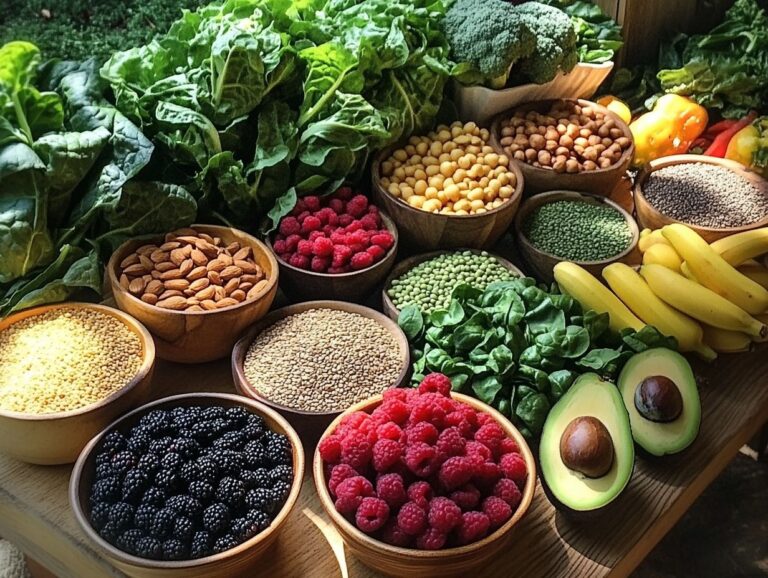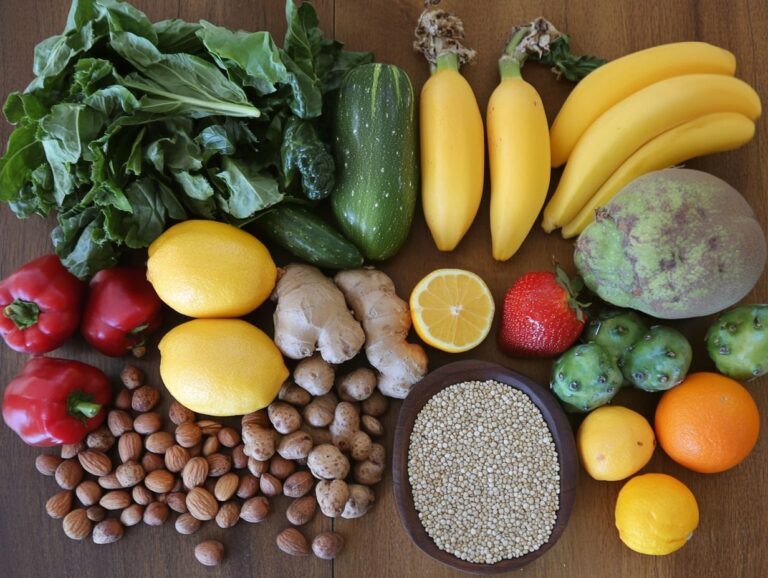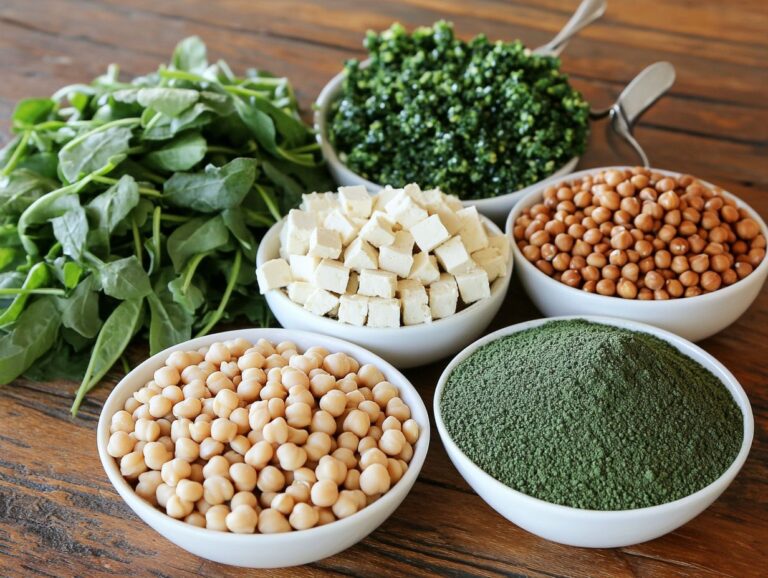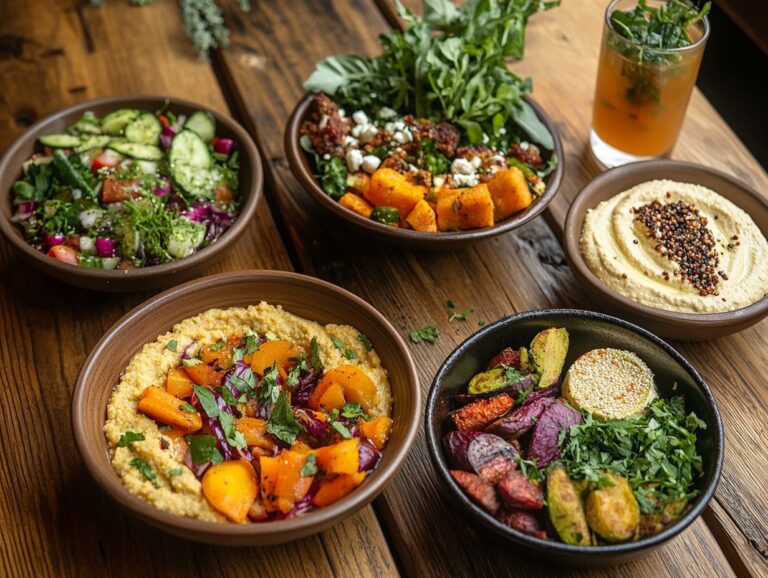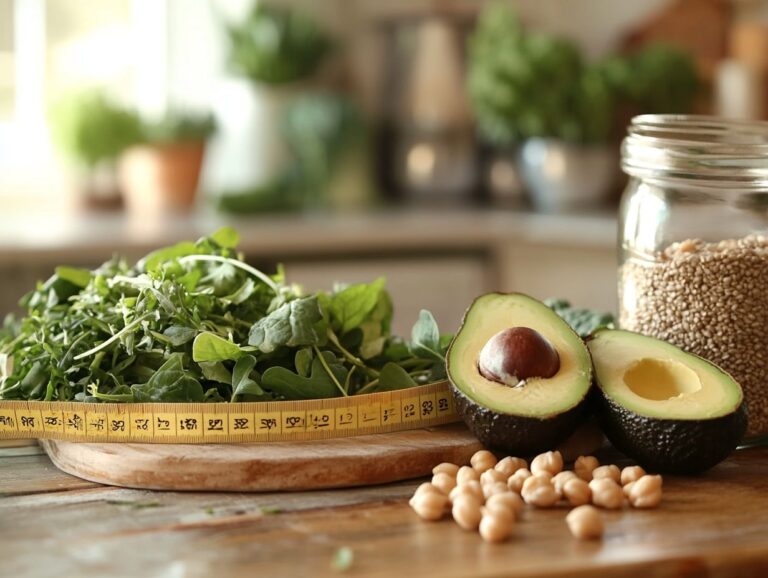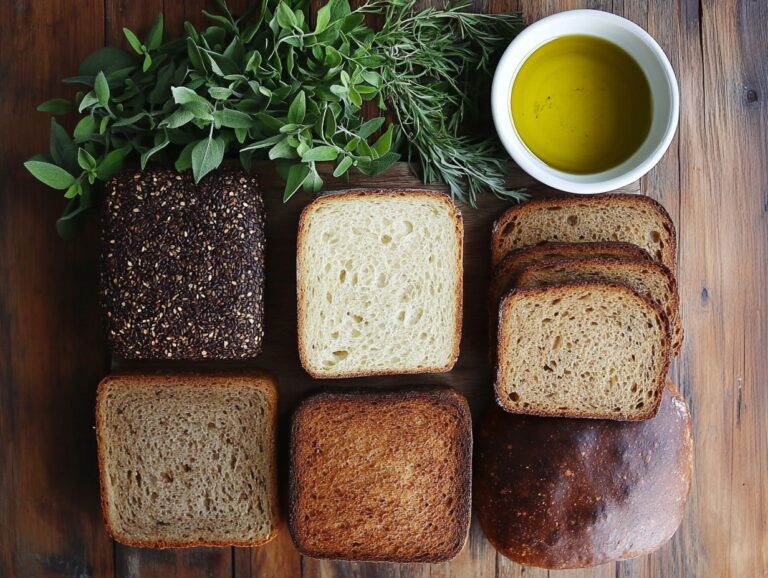In recent years, the plant-based diet has garnered significant attention due to its numerous health benefits, frequently being associated with weight loss. However, many individuals are discovering that a vegan diet can also facilitate healthy weight gain. This article aims to explore effective strategies for building mass while adhering to a nutritious plant-based lifestyle. It will cover essential nutrients, high-calorie foods, the importance of incorporating resistance training, and methods for monitoring progress. Readers will gain valuable insights to accomplish their weight gain objectives without compromising their health. Prepare to leverage the advantages of a plant-based diet for a stronger and healthier version of yourself.
Explaining the Benefits of a Plant-Based Diet for Weight Gain
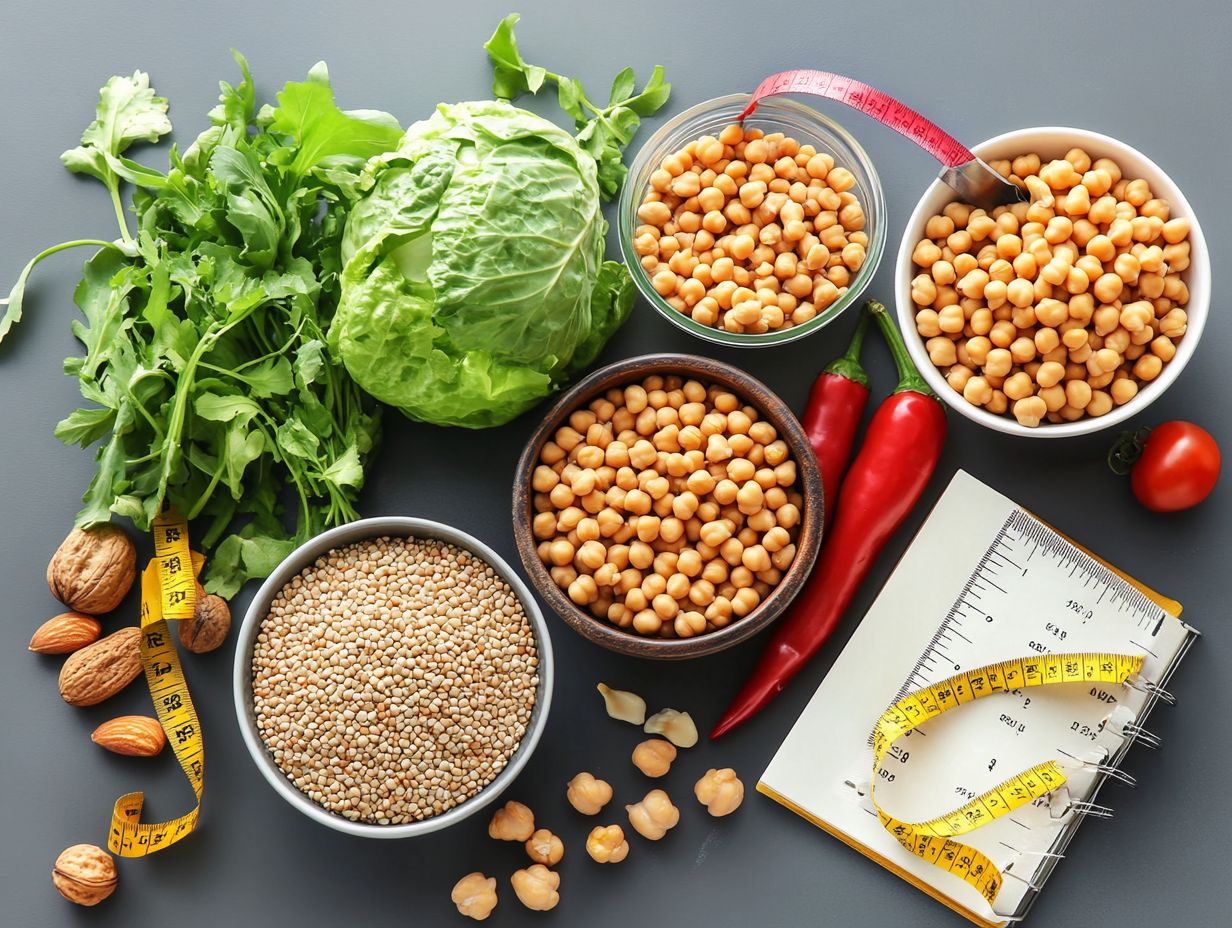 Adopting a plant-based diet can significantly facilitate weight gain, particularly for individuals such as bodybuilders and strength athletes who require a caloric surplus to effectively build muscle strength and achieve their fitness objectives. This dietary approach encompasses a wide array of vegetarian and vegan foods that are not only energy-dense but also rich in essential nutrients crucial for promoting healthy weight gain. Engaging in proper meal planning can further enhance the nutritional understanding necessary to achieve these goals. By prioritizing high-calorie and protein-rich foods such as legumes, nuts, and whole grains, individuals can optimize their nutritional intake while enjoying the diverse flavors and advantages associated with a plant-based lifestyle. Incorporating energy-dense foods like avocado, quinoa, and beans ensures a balanced approach to healthy weight management. Incorporating a variety of foods, including quinoa, lentils, chickpeas, and avocados, as well as protein sources like tofu, tempeh, and protein powders, can supply the necessary calories and healthy fats essential for muscle repair and growth. The presence of plant-based proteins can also stimulate hormone responses that promote muscle building, assisting athletes in achieving their desired physique. Prominent figures such as Arnold Schwarzenegger have advocated for the benefits of plant-based diets, sharing personal success stories that resonate with audiences globally. Documentaries like “The Game Changers” and films like “Escape Plan” highlight the potential of plant-based nutrition, inspired by the resilience of a silverback gorilla, to optimize health and physical transformations. This transition not only fosters a more sustainable way of living but also encourages individuals to adopt diverse eating habits for improved overall well-being.
Adopting a plant-based diet can significantly facilitate weight gain, particularly for individuals such as bodybuilders and strength athletes who require a caloric surplus to effectively build muscle strength and achieve their fitness objectives. This dietary approach encompasses a wide array of vegetarian and vegan foods that are not only energy-dense but also rich in essential nutrients crucial for promoting healthy weight gain. Engaging in proper meal planning can further enhance the nutritional understanding necessary to achieve these goals. By prioritizing high-calorie and protein-rich foods such as legumes, nuts, and whole grains, individuals can optimize their nutritional intake while enjoying the diverse flavors and advantages associated with a plant-based lifestyle. Incorporating energy-dense foods like avocado, quinoa, and beans ensures a balanced approach to healthy weight management. Incorporating a variety of foods, including quinoa, lentils, chickpeas, and avocados, as well as protein sources like tofu, tempeh, and protein powders, can supply the necessary calories and healthy fats essential for muscle repair and growth. The presence of plant-based proteins can also stimulate hormone responses that promote muscle building, assisting athletes in achieving their desired physique. Prominent figures such as Arnold Schwarzenegger have advocated for the benefits of plant-based diets, sharing personal success stories that resonate with audiences globally. Documentaries like “The Game Changers” and films like “Escape Plan” highlight the potential of plant-based nutrition, inspired by the resilience of a silverback gorilla, to optimize health and physical transformations. This transition not only fosters a more sustainable way of living but also encourages individuals to adopt diverse eating habits for improved overall well-being.
Essential Nutrients for Weight Gain on a Vegan Diet
To achieve effective weight gain on a vegan diet, it is essential to comprehend the critical nutrients that facilitate muscle growth and overall health. A well-structured vegan diet should incorporate a diverse array of protein-rich foods, vitamins, and minerals necessary to fulfill the caloric surplus required by bodybuilders and strength athletes. The use of olive oil and tahini in meal preparation can enhance caloric density without sacrificing nutritional value. This nutritional strategy underscores the significance of integrating legumes, grains, healthy fats, and beans to enhance both caloric density and nutrient intake.
Key Vitamins and Minerals for Building Mass
Key vitamins and minerals are essential in supporting muscle mass development on a vegan diet, particularly for individuals aiming for a caloric surplus to promote muscle growth. Nutrients such as protein, calcium, iron, and B vitamins play crucial roles in the metabolic processes that facilitate weight gain and enhance muscle strength. By incorporating a diverse array of protein sources, including legumes, grains, and nuts, individuals can effectively increase their nutritional intake and ensure they meet their dietary requirements. Calcium is vital for muscle contractions and can be obtained from fortified plant milks and dark leafy greens, while iron is necessary for oxygen transport to muscles and is plentiful in lentils and chickpeas. B vitamins, including B12, are integral to energy metabolism and can be sourced from fortified foods or nutritional yeast. Additionally, the inclusion of high-calorie vegan foods, such as avocados, nut butters, and quinoa, not only provides essential fats and carbohydrates but also supports a balanced diet that aids in achieving weight gain objectives effectively. Prioritizing a well-rounded diet is essential for optimizing muscle development and promoting overall health.
Plant-Based Protein Sources
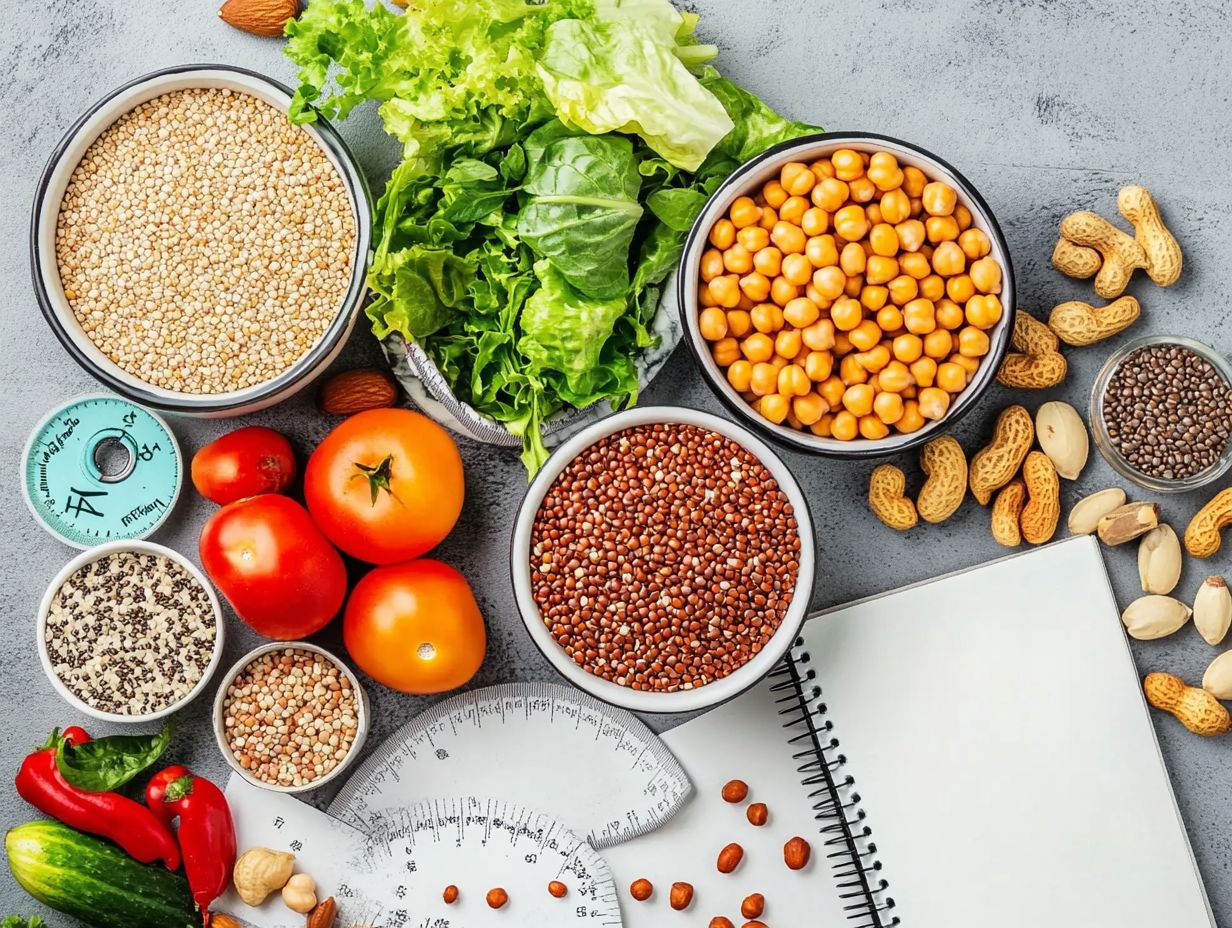 Plant-based protein sources are critical for individuals adhering to a vegan diet, particularly for those seeking to increase muscle mass and support weight gain. High-protein vegan foods such as legumes, nuts, seeds, and protein powders supply the essential amino acids required for muscle repair and growth. Incorporating energy-dense options like tofu, tempeh, and quinoa allows individuals to achieve a caloric surplus while enjoying a diverse range of flavors and textures. Furthermore, there are several exceptional sources of plant-based protein that offer significant nutritional benefits. For instance, lentils and chickpeas are abundant in both protein and fiber, making them particularly advantageous for muscle recovery and digestive health. Edamame provides a complete protein profile and can serve as an enjoyable addition to salads or stir-fries. Nut butters, such as almond or peanut butter, not only contribute protein but also healthy fats, making them ideal for incorporation into smoothies or as spreads. Including a variety of seeds, such as chia or hemp, in meals enhances nutrient absorption while adding a satisfying texture. By thoughtfully combining these ingredients in dishes such as quinoa salad, protein pancakes, hearty vegetable stir-fries, or sweet potato and rice bowls, individuals can effectively increase their daily protein intake.
Plant-based protein sources are critical for individuals adhering to a vegan diet, particularly for those seeking to increase muscle mass and support weight gain. High-protein vegan foods such as legumes, nuts, seeds, and protein powders supply the essential amino acids required for muscle repair and growth. Incorporating energy-dense options like tofu, tempeh, and quinoa allows individuals to achieve a caloric surplus while enjoying a diverse range of flavors and textures. Furthermore, there are several exceptional sources of plant-based protein that offer significant nutritional benefits. For instance, lentils and chickpeas are abundant in both protein and fiber, making them particularly advantageous for muscle recovery and digestive health. Edamame provides a complete protein profile and can serve as an enjoyable addition to salads or stir-fries. Nut butters, such as almond or peanut butter, not only contribute protein but also healthy fats, making them ideal for incorporation into smoothies or as spreads. Including a variety of seeds, such as chia or hemp, in meals enhances nutrient absorption while adding a satisfying texture. By thoughtfully combining these ingredients in dishes such as quinoa salad, protein pancakes, hearty vegetable stir-fries, or sweet potato and rice bowls, individuals can effectively increase their daily protein intake.
Tips for Increasing Calorie Intake on a Vegan Diet
Increasing calorie intake on a vegan diet is crucial for effective weight gain, particularly for individuals aiming to build muscle. By incorporating energy-dense foods into their meal planning, individuals can ensure that they meet their caloric surplus requirements. Strategies such as selecting high-calorie vegan foods, including nuts, avocados, dried fruits, and coconut oil, can substantially enhance overall caloric intake while still adhering to a healthy dietary approach.
High-Calorie Vegan Foods
High-calorie vegan foods are essential for individuals seeking to gain weight and build muscle on a vegan diet. Options such as nuts, seeds, avocados, and dried fruits are not only abundant in healthy fats and proteins but also provide the caloric density necessary for effective weight gain. Incorporating these foods into meals and snacks can facilitate the achievement of a caloric surplus. Along with these primary options, legumes such as lentils and chickpeas serve as excellent high-calorie choices, offering substantial protein and fiber. For example, a hearty lentil stew can be enhanced with coconut milk to increase both creaminess and caloric content. Furthermore, the addition of nut butters to smoothies or the use of tahini in salad dressings can improve both flavor and nutritional value. Whole grains like quinoa and brown rice also play a significant role in a balanced diet and can be combined with roasted vegetables, legumes, and nuts to create satisfying meals. By thoughtfully incorporating these foods, individuals can prepare delicious, nutrient-dense dishes that effectively support their weight gain objectives while maintaining a focus on health.
Meal Planning and Prepping Strategies
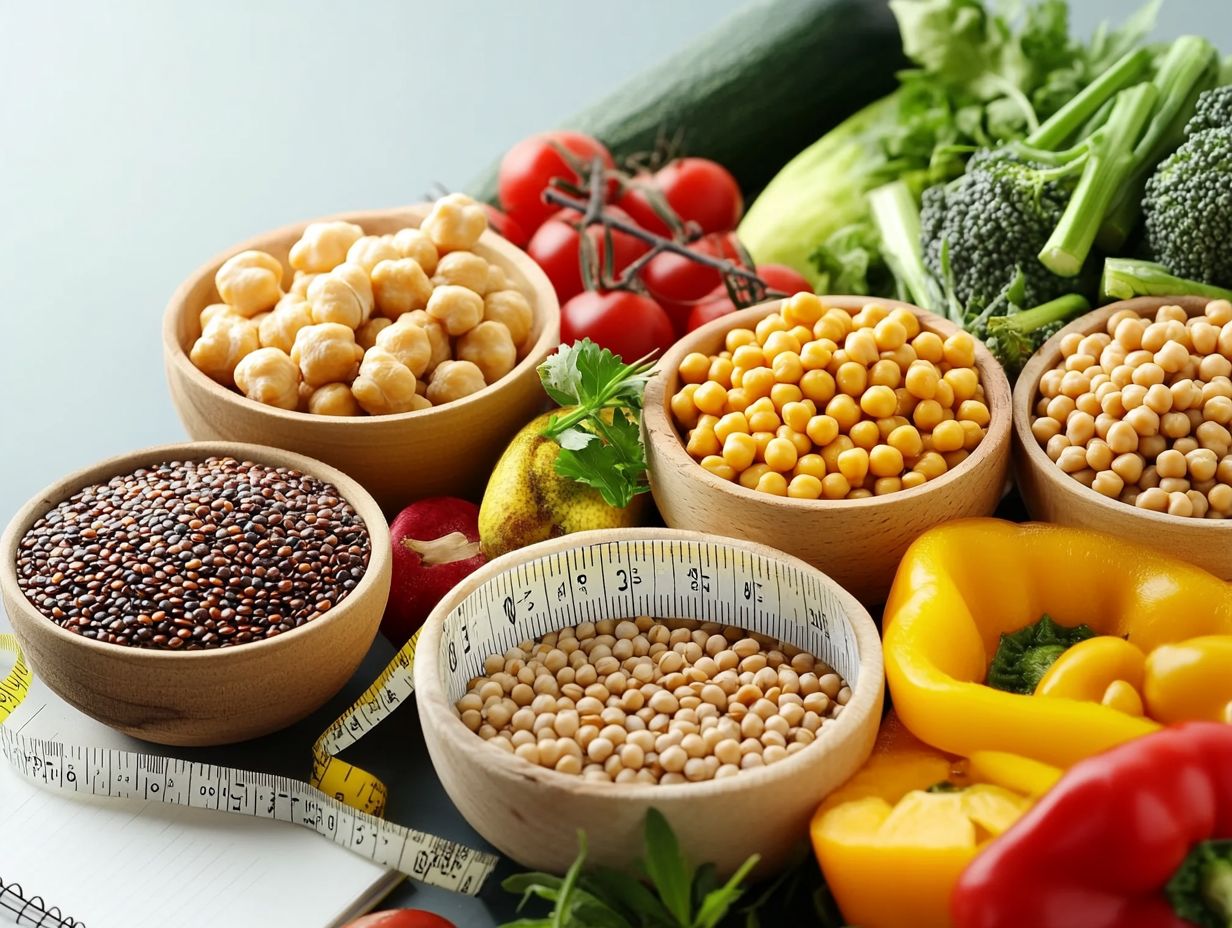 Effective meal planning and preparation are essential strategies for individuals following a vegan diet who aim for weight gain. By thoughtfully organizing meals and incorporating a variety of high-calorie and protein-rich foods, individuals can increase their caloric intake while remaining true to their dietary preferences. Planning meals in advance not only saves time but also ensures nutritional balance, facilitating the achievement of weight gain objectives. This approach promotes a more mindful eating habit, allowing for an enriched culinary experience. Emphasizing techniques such as batch cooking can significantly enhance kitchen efficiency; preparing larger quantities of meals for the week reduces the need for extensive cooking on busy days. Furthermore, storing these meals in portioned containers makes them readily accessible, encouraging the spontaneous consumption of nutritious, calorie-dense options. Incorporating a diverse range of ingredients not only enhances flavor but also ensures comprehensive nutrient coverage, helping to prevent monotony and maintain enthusiasm for a healthy lifestyle. This thoughtful preparation equips individuals to navigate their food choices with greater confidence and creativity.
Effective meal planning and preparation are essential strategies for individuals following a vegan diet who aim for weight gain. By thoughtfully organizing meals and incorporating a variety of high-calorie and protein-rich foods, individuals can increase their caloric intake while remaining true to their dietary preferences. Planning meals in advance not only saves time but also ensures nutritional balance, facilitating the achievement of weight gain objectives. This approach promotes a more mindful eating habit, allowing for an enriched culinary experience. Emphasizing techniques such as batch cooking can significantly enhance kitchen efficiency; preparing larger quantities of meals for the week reduces the need for extensive cooking on busy days. Furthermore, storing these meals in portioned containers makes them readily accessible, encouraging the spontaneous consumption of nutritious, calorie-dense options. Incorporating a diverse range of ingredients not only enhances flavor but also ensures comprehensive nutrient coverage, helping to prevent monotony and maintain enthusiasm for a healthy lifestyle. This thoughtful preparation equips individuals to navigate their food choices with greater confidence and creativity.
Resistance Training for Building Muscle on a Vegan Diet
Resistance training is an essential aspect of building muscle on a vegan diet, as it effectively complements nutritional intake and facilitates weight gain. Engaging in targeted workouts enables individuals, particularly strength athletes, to stimulate muscle growth while ensuring that their dietary choices are aligned with their fitness objectives. Incorporating a diverse range of exercises, reminiscent of the 60s hippie culture’s holistic approach, can optimize muscle strength and amplify the advantages of a plant-based diet.
Effective Vegan Workouts for Muscle Growth
Effective vegan workouts aimed at muscle growth emphasize resistance training exercises that enhance strength and promote hypertrophy. Incorporating compound movements such as squats, deadlifts, and bench presses can significantly contribute to muscle gain while complementing a plant-based diet that is rich in protein sources like beans and grains. Customizing workouts to align with individual goals enables strength athletes to optimize their potential and achieve the desired results. Along with these foundational exercises, including isolation movements such as bicep curls and tricep extensions can effectively target specific muscle groups, thereby providing a balanced approach to training. Bodybuilders and strength athletes often incorporate these exercises into their routines to enhance muscle strength and development. Implementing progressive overload gradually increasing weights or resistance can further challenge the muscles, fostering growth over time. Achieving a caloric surplus through a high-calorie, protein-rich diet is also essential for those looking to gain muscle strength. Bodyweight exercises, including push-ups and lunges, offer versatile options suitable for various fitness levels, allowing individuals to participate while still promoting muscle development. These exercises are often part of a plant-based diet strategy featured in documentaries like The Game Changers. Maintaining proper nutrition is equally critical; a well-rounded vegan diet that includes legumes, nuts, whole grains, and protein sources such as tofu and tempeh not only fuels workouts but also supports recovery and muscle synthesis. Celebrities like Arnold Schwarzenegger have adopted plant-based diets for improved health and performance.
Importance of Rest and Recovery
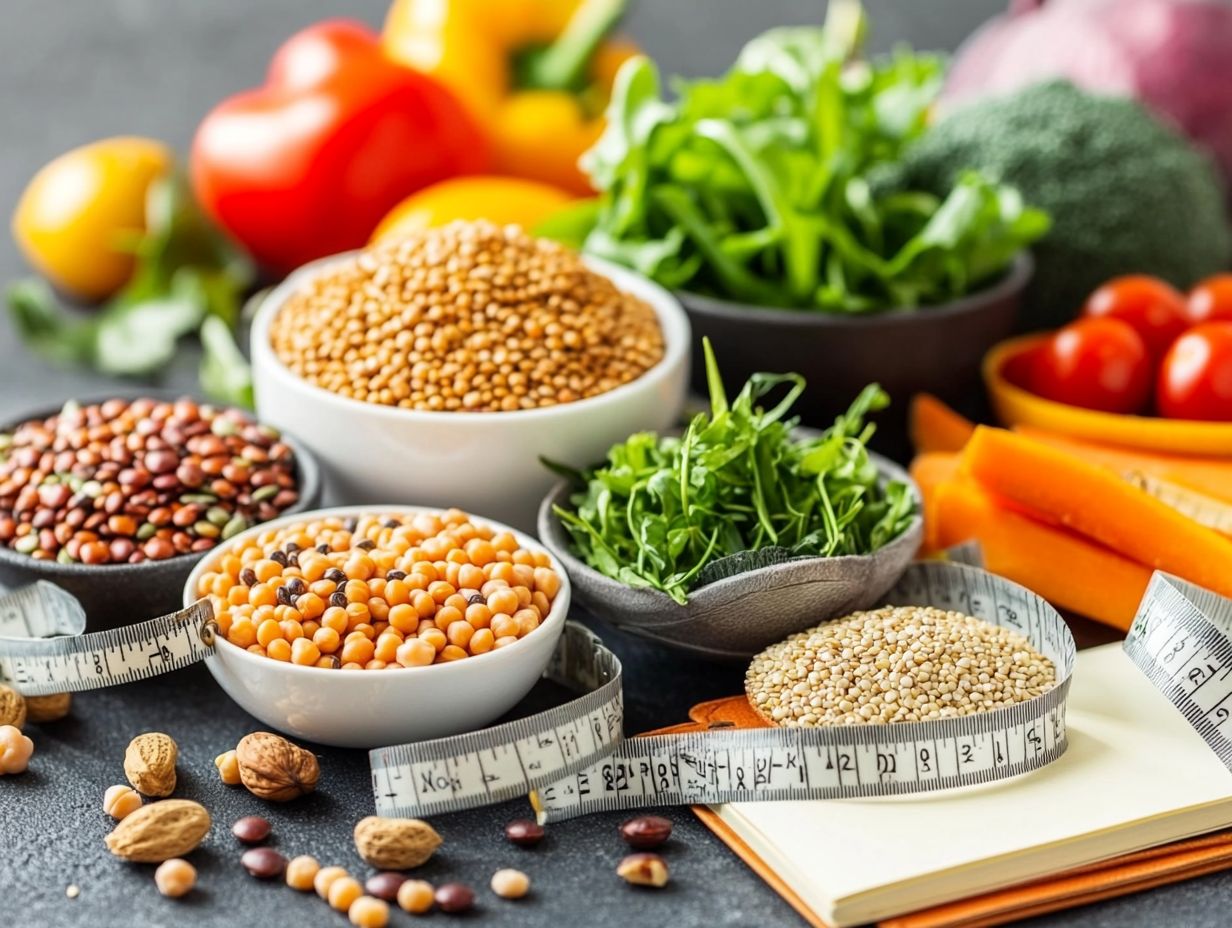 The significance of rest and recovery is crucial for muscle growth, particularly within the framework of a vegan diet, where nutritional intake is integral to the recovery process. Allowing muscles sufficient time to recover after resistance training not only prevents injuries but also optimizes performance and enhances strength gains. Silverback gorillas, known for their strength, naturally incorporate rest as part of their routine in the wild. Incorporating adequate rest periods into training regimens is essential for individuals to effectively support their dietary choices and improve their overall fitness outcomes. A focus on energy-dense vegan foods and meal planning can further assist in achieving these goals. To maximize recovery, it is imperative to implement strategies such as:
The significance of rest and recovery is crucial for muscle growth, particularly within the framework of a vegan diet, where nutritional intake is integral to the recovery process. Allowing muscles sufficient time to recover after resistance training not only prevents injuries but also optimizes performance and enhances strength gains. Silverback gorillas, known for their strength, naturally incorporate rest as part of their routine in the wild. Incorporating adequate rest periods into training regimens is essential for individuals to effectively support their dietary choices and improve their overall fitness outcomes. A focus on energy-dense vegan foods and meal planning can further assist in achieving these goals. To maximize recovery, it is imperative to implement strategies such as:
- active recovery sessions
- proper hydration
- restorative practices, including yoga or stretching
A balanced vegan diet that is rich in protein sources, such as legumes, nuts, whole grains, tofu, and tempeh, can further facilitate the recovery process by providing essential amino acids. Additionally, including anti-inflammatory foods, such as berries and leafy greens, not only supports muscle repair but also improves endurance. High-calorie snacks like dried fruit and energy-dense foods like avocado and sweet potatoes can also contribute to recovery. When combined with quality sleep, these recovery techniques collectively enable individuals to sustain workout intensity while promoting muscle growth and overall health.
Staying Healthy on a Vegan Weight Gain Diet
Maintaining health while following a vegan weight gain diet necessitates a thoughtful approach to dietary choices and nutrient intake. Incorporating protein powders and caloric density strategies can aid in healthier weight gain. It is crucial to ensure that the diet is balanced and encompasses a variety of food groups, including grains, beans, and healthy fats like coconut oil and olive oil, to prevent deficiencies that may impede muscle growth and overall well-being. By prioritizing whole food sources and high-calorie options, such as quinoa, tahini, and rice, individuals can successfully achieve their weight gain goals while promoting their health.
Balancing Nutrient Intake and Avoiding Deficiencies
Balancing nutrient intake is essential for individuals following a vegan diet, particularly when the objectives include weight gain and muscle development. It is imperative to monitor key nutrients such as protein, omega-3 fatty acids, iron, and vitamin B12 to prevent deficiencies that could hinder progress. A detailed nutritional understanding and monitoring caloric surplus can assist in tracking progress. Incorporating a diverse array of food sources, including legumes, nuts, grains, and energy-dense foods like tahini and coconut oil, can facilitate the attainment of nutritional requirements while promoting healthy weight gain. Additionally, it is important to explore a wide variety of fruits and vegetables to ensure a comprehensive intake of vitamins and minerals. For instance, dark leafy greens serve as valuable sources of iron, while avocados and flaxseeds provide excellent sources of healthy fats, which are beneficial for cardiovascular health and caloric density. By selecting an assortment of colors and types of produce, individuals can enhance nutrient absorption and maintain meal variety. In some cases, fortified foods or supplements may be necessary, particularly for vitamin B12 and potentially vitamin D, especially for those with limited exposure to sunlight. Nutritional understanding and consulting with experts on dietary choices can help tailor needs. Developing a well-rounded meal plan that incorporates these considerations not only supports overall health but also encourages sustainable weight management and muscle growth.
Monitoring Weight Gain Progress and Adjusting Diet as Needed
Monitoring weight gain progress is crucial for individuals following a vegan diet, as it enables them to adjust their caloric intake effectively and ensure they are meeting their weight gain objectives. The hippie culture of the 60s embraced plant-based diets, showing early awareness of dietary impacts. By regularly assessing body composition and making necessary adjustments to their diet, individuals can maintain a strong focus on their nutritional understanding. This proactive approach assists in fine-tuning dietary choices to optimize muscle growth and overall health. Incorporating periodic weigh-ins and taking body measurements allows for the tracking of fluctuations that may indicate the need for dietary adjustments. Maintaining a food diary can be particularly valuable, as it helps identify nutrient intake and caloric consumption. This helps in adjusting dietary choices, ensuring a caloric surplus for muscle growth. If results reveal stagnation or any undesired changes, it may be necessary to modify portion sizes or include calorie-dense vegan foods such as nuts, avocados, and legumes. Consulting with a nutritionist can provide customized guidance on achieving macronutrient balance while reaching vital weight gain milestones in a natural manner.
